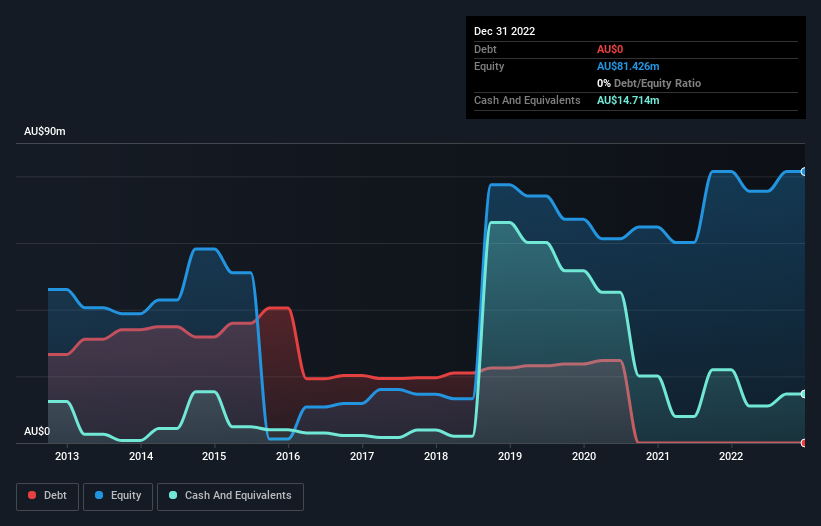- Australia
- /
- Metals and Mining
- /
- ASX:POS
Is Poseidon Nickel (ASX:POS) In A Good Position To Deliver On Growth Plans?
We can readily understand why investors are attracted to unprofitable companies. For example, although Amazon.com made losses for many years after listing, if you had bought and held the shares since 1999, you would have made a fortune. But while the successes are well known, investors should not ignore the very many unprofitable companies that simply burn through all their cash and collapse.
So should Poseidon Nickel (ASX:POS) shareholders be worried about its cash burn? For the purposes of this article, cash burn is the annual rate at which an unprofitable company spends cash to fund its growth; its negative free cash flow. We'll start by comparing its cash burn with its cash reserves in order to calculate its cash runway.
View our latest analysis for Poseidon Nickel
When Might Poseidon Nickel Run Out Of Money?
A company's cash runway is calculated by dividing its cash hoard by its cash burn. As at December 2022, Poseidon Nickel had cash of AU$15m and no debt. In the last year, its cash burn was AU$19m. So it had a cash runway of approximately 9 months from December 2022. To be frank, this kind of short runway puts us on edge, as it indicates the company must reduce its cash burn significantly, or else raise cash imminently. The image below shows how its cash balance has been changing over the last few years.

How Is Poseidon Nickel's Cash Burn Changing Over Time?
Because Poseidon Nickel isn't currently generating revenue, we consider it an early-stage business. So while we can't look to sales to understand growth, we can look at how the cash burn is changing to understand how expenditure is trending over time. Given the length of the cash runway, we'd interpret the 25% reduction in cash burn, in twelve months, as prudent if not necessary for capital preservation. Clearly, however, the crucial factor is whether the company will grow its business going forward. For that reason, it makes a lot of sense to take a look at our analyst forecasts for the company.
How Easily Can Poseidon Nickel Raise Cash?
Even though it has reduced its cash burn recently, shareholders should still consider how easy it would be for Poseidon Nickel to raise more cash in the future. Companies can raise capital through either debt or equity. Many companies end up issuing new shares to fund future growth. We can compare a company's cash burn to its market capitalisation to get a sense for how many new shares a company would have to issue to fund one year's operations.
Since it has a market capitalisation of AU$106m, Poseidon Nickel's AU$19m in cash burn equates to about 18% of its market value. As a result, we'd venture that the company could raise more cash for growth without much trouble, albeit at the cost of some dilution.
So, Should We Worry About Poseidon Nickel's Cash Burn?
On this analysis of Poseidon Nickel's cash burn, we think its cash burn reduction was reassuring, while its cash runway has us a bit worried. Looking at the factors mentioned in this short report, we do think that its cash burn is a bit risky, and it does make us slightly nervous about the stock. Taking a deeper dive, we've spotted 4 warning signs for Poseidon Nickel you should be aware of, and 2 of them make us uncomfortable.
Of course, you might find a fantastic investment by looking elsewhere. So take a peek at this free list of companies insiders are buying, and this list of stocks growth stocks (according to analyst forecasts)
New: Manage All Your Stock Portfolios in One Place
We've created the ultimate portfolio companion for stock investors, and it's free.
• Connect an unlimited number of Portfolios and see your total in one currency
• Be alerted to new Warning Signs or Risks via email or mobile
• Track the Fair Value of your stocks
Have feedback on this article? Concerned about the content? Get in touch with us directly. Alternatively, email editorial-team (at) simplywallst.com.
This article by Simply Wall St is general in nature. We provide commentary based on historical data and analyst forecasts only using an unbiased methodology and our articles are not intended to be financial advice. It does not constitute a recommendation to buy or sell any stock, and does not take account of your objectives, or your financial situation. We aim to bring you long-term focused analysis driven by fundamental data. Note that our analysis may not factor in the latest price-sensitive company announcements or qualitative material. Simply Wall St has no position in any stocks mentioned.
About ASX:POS
Poseidon Nickel
Engages in the exploration, mining, and production of mineral properties in Australia.
Excellent balance sheet slight.
Similar Companies
Market Insights
Community Narratives



